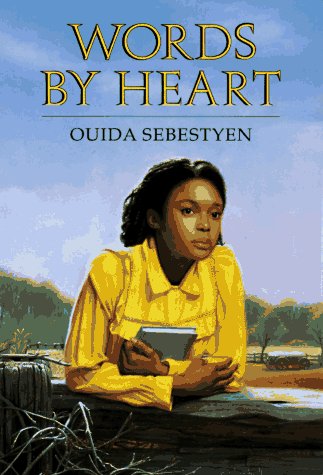REVIEW of WORDS BY HEART by OUIDA SEBESTYEN
WORDS BY HEART
Ouida Sebestyen
Yearling
Reprint released January 1, 1997
SUMMARY
Lena can recite the Scriptures by heart. Hoping to make her adored Papa proud of her and to make her white classmates notice her "Magic Mind," not her black skin, Lena vows to win the Bible-quoting contest. But winning does not bring Lena what she expected. Instead of honor, violence and death erupt and strike the one she loves most dearly. Lena, who has believed in vengeance, must now learn how to forgive.
Ouida Sebestyen
Yearling
Reprint released January 1, 1997
SUMMARY
Lena can recite the Scriptures by heart. Hoping to make her adored Papa proud of her and to make her white classmates notice her "Magic Mind," not her black skin, Lena vows to win the Bible-quoting contest. But winning does not bring Lena what she expected. Instead of honor, violence and death erupt and strike the one she loves most dearly. Lena, who has believed in vengeance, must now learn how to forgive.
The theme of separateness rings throughout Words by Heart.
From the first scene of the book, we see Lena up on a stage in front of the
whole town. Obviously, from her skin color, she is immediately separated from
the other children in the scripture contest. But then, when she wins, the town
leaders once again separate her when they give her a tie for a prize, a boy’s
prize. Even in her family, Lena feels separateness. She feels extremely close
to her father, but she has a stepmother who is not too much older than she is.
And Sebestyen separates Lena from the younger children by creating a vast
difference in their ages. Hence, Lena feels separated from almost everyone in
her world—from everyone except her gentle father. This theme of separateness
makes the lesson about forgiveness at the end all the more poignant.
Going back
to the first scene, Lena views the scripture contest as a way to bridge the gap
between herself and the rest of the children in the town. As a black newcomer
in a mostly white community, Lena’s eager to make new friends and be accepted.
While on the stage, she feels the weight of their eyes on her. And when she
recites the Song of Solomon scripture—“I am black but comely”—she feels she has
given away something special, something sacred to herself and her heritage. But
she feels a connection with her opponent as they memorize scriptures together
in harmony, one after the other, verse by verse.
Even in her
own family, Lena feels a sort of separateness. Of course, she loves her
stepmother and half brother and sister, but they’re not completely hers. She
doesn’t feel the same “wholeness” of connection with them that she does with
her father. Lena also comes to realize that her stepmother is not that much
older than she is, and this makes Lena feel like less of a daughter to her than
a helper. In several parts of the novel, Lena seems more like a baby-sitter to
the younger children than a sister—although those two positions are often one
and the same. Lena feels closest to her father because he has been a constant
in her life and shares all of her memories. The closeness she feels to her
father makes the lesson in forgiveness more difficult and poignant than it
could with any other character.
It’s easy
to see where Lena gets her background in the Bible. Her father sometimes sounds
like a walking Sermon on the Mount, but he doesn't know the Bible just on the
surface; he has integrated it into the deepest recesses of his soul. And when
tragedy strikes, Lena finally starts to understand.
This is a
beautifully written book with wonderful themes of forgiveness, racism, and
family relationships. There's an old 1985 TV movie based on the book that was
nominated for two Primetime Emmys.


Lena can recite scriptures by heart. Hoping to make her adored papa proud of her ans make her white classmates notice her magic mind not her black skin.
ReplyDelete